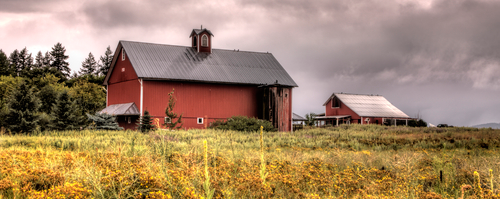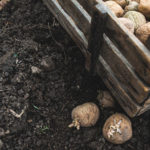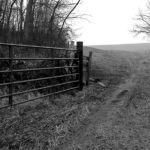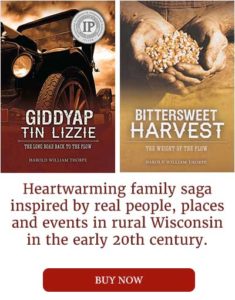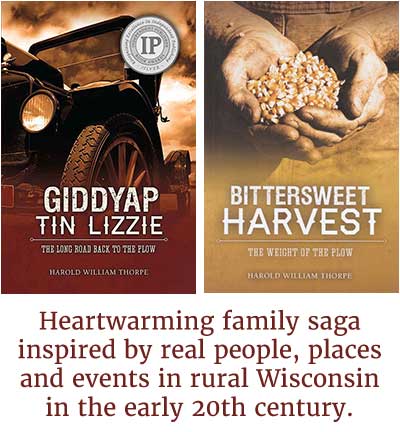Spring Storm
>> Download this outtake as a PDF >>
March, 1936
We had arrived at the farm in late February, and March passed like a fuzz ball in the wind. I watched wide-eyed as men unloaded a new shipment of animals each week. Sharon was appointed mother’s helper, but Ruby and I begged for outside chores. Sharon seemed determined to tolerate our move to Willow and seldom complained until she heard there were only five students in her ninth-grade class, and they were all girls. But I was glad the girls outnumbered the boys in my seventh-grade class.
Until the animals arrived our move to Willow was nothing but a change in house, teachers, and classmates. Mom said that our farm home was small compared to our Ashley Springs home. And I suppose it was, but it seemed big to me, although it wasn’t nearly so fancy.
Like most Wisconsin farm houses, it was a white, wood-framed, two-story building. On the first floor there was a large kitchen and a larger living room, a dining room, a parlor, and a small bedroom. Upstairs there were four bedrooms which were reached by staircases in the front and the back of the house. Ruby and Sharon fought over one of those bedrooms, but Ruby won. Ruby always won. Ruby and I both wanted the largest room, but Mom said neither of us could have it unless we decided to room together. Mother used two of the bedrooms upstairs to store her remaining Ashley Springs furniture. She couldn’t bear to part with those treasures.
But the wraparound porch was the most fun place of all. It had a wide swing where we loved to sit on hot summer evenings. I’ll never forget the day that Ruby and I scared the begeebers out of Sharon and Ed when they were courting out there.
I watched wide-eyed as a few cows, chickens, and sheep joined us on the farm, but tomorrow, when the last cows and sheep arrived, we’d become full-fledged farmers. I’d expected the transformation all week, and Dad said that Ruby and I could stay home from school to help unload the cows and sheep that were to be delivered. But plans changed when the postmaster called that evening and said, “Get down here and pick up your chicks. I can’t stand their incessant peeping.”
Dad called Ruby and me aside and said, “You might as well go to town tomorrow to get them. You’ll be responsible for their care and feeding, and if you do well, I’ll put a quarter of the egg profits into your college funds.”
I knew that was Mother’s idea.
Animals on my mind, I slept fitfully and was wide awake when the morning sun lighted our room. But light flooding through the window didn’t impress Ruby. She didn’t stir from the spot she’d commandeered the night before. And she didn’t rouse when, too excited to sleep, I jumped from the bed and pulled a paper from my writing desk and began to work on the poem I’d started the night before. She didn’t even stir when lamp light flooded the room. How could she stay so calm?
But I was too excited to think straight, so I decided to read my favorite poet, Miss Emily Dickinson. She always had something for the occasion. I turned the pages and found:
A Light Exists in Spring
A light exists in spring
Not present on the year
At any other period.
When March is scarcely here
A color stands abroad
On solitary hills
That science cannot overtake,
But human nature feels.
It waits upon the lawn;
It shows the furthest tree
Upon the furthest slope we know;
It almost speaks to me.
Then, as horizons step,
Or noons report away,
Without the formula of sound,
It passes, and we stay.
A quality of loss
Affecting our content,
As trade had suddenly encroached
Upon a sacrament.
I always loved Emily Dickinson’s poems. I felt a kinship with her, too. She was brilliant but shy and retiring. I don’t think she would have been half as productive if she had married.
The cattle trucks hadn’t arrived when Ruby and I left for Willow. I sat next to my sister, who drove old Fanny and Mabel. “I never thought Dad would let us take the sleigh,” I said. “I thought we’d drive Fanny on the cutter. We’ve never driven the sleigh before.”
“The cutter’s too small,” Ruby said. “It’s no big deal, sis. The sleigh’s no larger than a hay wagon, and I’ve driven that.”
“Dad said to be careful on the roads,” I warned her. “They’re full of rocks, and if we hit one, we could tear a track off the runner. You better go slower, Ruby.”
“Move it, Fanny,” Ruby hollered.
“Ruby!”
“It’s getting colder, sis. Gotta make time.”
“Dad said to be careful.”
The sun shined warm, but we could see clouds forming in the distance, and an occasional breeze gusted from the northwest.
Ruby pushed Fanny and Mabel until we got to the edge of Willow. She drove up Main Street but stopped when she saw Jack Hornking, a student in Sharon’s class, stroll from the feed mill. I wondered why he wasn’t in school today.
“Jack,” Ruby hollered, “whatcha up to?”
“Trying to find some work,” he said. “Thought Peterman could use help, but he’s not hiring. Not now anyway.”
“I think Dad may be looking, but he can’t pay much. The food’s good, though. Should I ask him?”
“Didn’t want farm work, but I may have no choice. Pa says I’ve gotta get a job — or else.”
“Or else what?” I said.
“Don’t know, but it can’t be good. He knocked the crap outa me last week — and I just asked him why when he told me to bring up kindling wood. It ain’t even winter, yet. He said I was impudent, an impudent brat — whatever that is.”
“Brat?” Ruby said. “It’s like a — a spoiled baby.”
“Well, I know that. It’s impudent I don’t know.”
“Kinda like cheeky,” I said. “Or ill-mannered.”
“Why’d he not say so? Sure, ask your dad if he needs help.”
“Getup, Mabel, Fanny.” Ruby clucked her tongue against her palate.
Fanny strained against Mabel’s lead.
“Let’s hurry to the post office,” I said. “We don’t want Mr. Yankstead to think we forgot. He might call Mother again.”
“Oh, stop your fussin’,” Ruby said. “Let’s stop at the ice cream parlor. I’ll buy an ice cream and we can split it. I have a nickel.”
“I don’t think we should. It’s getting colder. We better get the chicks.”
“We’ll just stop a few minutes.”
Ruby pulled me through the drugstore door, but she didn’t have to tug for long. The candy-striped seats and sweet smells from the open candy jars beckoned me toward Ruby’s intended destination. A skinny, bald man with large, harvest-moon eyes and a crescent-moon smile stood behind the counter.
“Sir, can you put ice cream in a cup and give us two spoons?” Ruby said.
“June Jordy at your service.” He took a paper cup off the shelf. “What kind would you like, young ladies?”
“Butter pecan,” Ruby said.
“Strawberry,” I said.
“What’ll it be girls?” Jordy took a penny from his pocket. “Shall I flip a coin?”
“No,” Ruby said. “I’m paying for it. Butter pecan.”
“You know I’m not fond of nuts, Ruby.”
“You can pick them out. Butter pecan, Mr. Jordy.”
I nodded.
“I hate to see family dissention. You’re new to town, aren’t you? What’d you say your names were?”
“I’m Ruby, and this is my sister Catherine. O’Shaughnessy. We’re on the Barnes’ old farm. Up-river from here.”
“I’d heard that someone had moved there.” He thrust his hand toward Ruby. “Nice to meet you, young lady.”
His fingers were so long and thin they reminded me of the legs of a daddy longlegs.
He nodded toward me. “And you, too, miss. Tell you what I’ll do.” He smiled at me, and then he turned and took another dish off the shelf. “I’ll give you two scoops for your nickel, one butter pecan, the other strawberry. Let’s just call it primin’ the pump. I hope to see you often.”
We thanked Mr. Jordy and sat on the high stools at the counter, watching him scoop the ice cream.
Later, as I spooned the ice cream from the bottom of my dish, I remembered the chicks. “Ruby, we’ve gotta get to the post office. It’s getting late.”
Ruby untied the horses from the hitching post while I pulled straw forward to make space for the boxes. “It’s getting colder every minute,” I said. “And clouds are coming in from the northwest. We’d better hustle.”
At the post office, Mr. Yankstead confirmed my observations. “A spring storm’s moving down from the north. The Richland Center postmaster called and said it’s snowing hard there. Should hit within the hour. You’d better head straight home, girls.”
He removed the chicks from the back room. “Sure’ll be glad to get them outa here. They’ve been driving me crazy.” Mr. Yankstead helped us load the four boxes into the back of the sleigh. “Poor things, probably hungry. Better cover them and get a move on. Don’t get caught in the storm.”
Ruby turned the sleigh away from town and headed up the river road. She urged the horses ahead, and even Fanny moved faster than usual. I sat in back and tried to keep the chicks covered with straw, but the wind blew the stalks away. “Not too fast, Ruby,” I shouted forward. “Remember, Dad said to be careful.”
“Who’s doing the driving, anyhow? Just take care of the chicks.” She snapped the reins. “Get moving, Fanny.” The horses surged forward. “I think they know it’s nasty behind us.”
“I think they want some fresh hay,” I said.
The sleigh bumped and swerved along the rutted road. “Not so fast, Ruby. You’ll throw a track.”
Ruby pressed forward.
We were half way home and there was still no snow.
“I think we’ll make it before the storm hits,” Ruby said.
But we’d not gone another hundred yards when the sleigh lurched and skidded hard to the right. The horses leaned into their rigging, but the weight of the disabled sleigh brought them to a halt. “What is it?” I shouted forward.
Without a word, Ruby jumped to the ground, and I followed. When I looked down I saw that the track, now perpendicular to the runner, had gouged a ten-yard gash into the snowy road, gravel strewn about. “I said you were driving too fast, Ruby.”
“Oh, shut up. The track must have been loose.”
“What’ll we do?” I said. “It’s getting colder. The chicks might freeze.”
“It’s too far to walk. I’ll unhook Fanny and ride her home.”
“No, take Mabel. She’s faster. I’ll stay with the chicks and do my best to keep them warm.”
“That’s the first good idea you’ve had today, sis. You’re right, we can’t leave them alone in the cold.”
Ruby looked back toward the town we’d just left. “Look, the storm clouds are over Willow now. It won’t be long before it hits here. You’ll have to keep the straw on the chicks, and not let the wind blow it away. I’ll come back with help.”
The thought of being alone swept through me, and my stomach churned. “Hurry back, Ruby!”
She released Mabel from the rigging and climbed astride. “You better free up Fanny, too. She needs to keep warm.”
I was about to ask for help, but before I got the words out, Ruby turned Mabel and rode toward home, never looking back. I wanted to save the chicks, but I felt abandoned as Ruby disappeared into the distance. Why did Ruby always tell me what to do? Why did I always do it?
At first a gentle wind whipped chaff around inside the sled, but soon, the trees leaned and the tall grass flattened. The wind drove falling snow horizontally across the road. I knew I was stuck in the worst possible place, out in the open in a spring blizzard.
Snow swirled around the boxes before exiting the back end. Fanny knew winter blizzards, so I thought that she’d be okay if I could get her free. She’d set her own pace for home. I loosened the traces and urged Fanny forward.
Fanny stepped out of the rigging but stopped and looked back, as if she didn’t want to leave me alone—at least, that was what I imagined. Fanny neighed softly, but when I stayed put, she turned toward home.
I was alone with the chicks. The snow whipped across my eyes, stinging so badly that I winced every time I turned into it. I trudged through the deepening snow to the back of the sleigh and climbed through the opening. I crawled to the boxes and heard the chicks’ frantic peeping. I pulled straw forward and stuffed handfuls around the enclosures. But each handful that I pushed against a box was soon whipped away by the wind, forever lost in the white wilderness.
The chicks would die if I couldn’t keep them warm. I remembered reading that pioneers would burrow into a snowdrift to keep warm when they were caught outside in frigid weather. Maybe if I could gather enough snow? I jumped out the back of the sled and began throwing handfuls of snow into the wagon, around the boxes of chirping chicks. I must keep the chicks warm. But, like the straw before it, the snow whisked away. It was a light, fluffy snow, the kind I loved when I was safe at home on a calm night, and moonlight reflected off the snowflakes’ million facets. But there was no beauty in it now. The snow continued to follow the straw out into the netherworld.
How I wished it was the wet, heavy snow that fell on warmer spring days. I scanned the roadside ditches. Maybe water remained from last week’s thaw. But I saw nothing but white snow, and I didn’t dare leave the chicks to search further.
Then I remembered: whenever I threw snowballs and the snow didn’t pack, I’d remove my mittens and warm it until it melted into lumps of hard missiles. But I needed so much.
I warmed and piled snow for what seemed like hours, although I knew it couldn’t have been nearly that long.
My fingers first began to ache, and then they became numb. I placed the chicks in two boxes, hoped they’d stay warm huddled tight against each other. I didn’t dare place them all in one box: I’d heard stories about chicks piling together and smothering. I rubbed my hands together to warm them, and tried wiping some of the wetness away on the remaining straw, but to no avail, the straw was now covered with a hoary veneer.
Ruby should have returned by now.
I thought the wind had died down, but I was too numb all over to know for sure. With the little energy and resolve that remained within me, I pushed the straw against three sides of the boxes, piled a little snow over the top, and snuggled my frozen body against the open side. I was too tired to do more—and I’d lost my desire to care. I barely heard Dad’s voice when he arrived half an hour later.
Dad got me home, but I remember little about the trip. I responded a little when Dr. Snyder and Mom massaged my arms and legs, and I remember Dr. Snyder taking my temperature and blood pressure.
“You’re lucky to be alive, Miss O’Shaughnessy,” Dr. Snyder said. “I dread to think what another half an hour would have brought.”
He turned to Mom and Dad. “Keep her in the house, out of the cold until after Easter. We don’t want pneumonia to set in.”
“Did the chicks live, Dad?” I said.
“We’d not have any if it wasn’t for you, young lady.” Dad took my hand and Ruby nodded when he said, “We’ll save the money from their eggs for your college fund, my brave young daughter.”
I could see that Ruby was scared. She looked toward me with a weak smile that brightened her wan face only a bit. I felt exhausted and miserable. Maybe farming was more than I’d bargained for.
If you enjoyed the story above, please consider purchasing and reading the award winning book it was developed for: Giddyap Tin Lizzie, or the other books of the O’Shaughnessy Chronicles.

